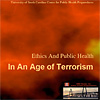


|
|
|
|
|
|
|
|
|
|
|
|
||||||||||||||
|
||||||||||||||
|
|
||||||||||||||
|
||||||||||||||
|
Posted
11/16/2007
With a nod to Nationwide, the University of South Carolina wants public health workers to know what to do when that happens. How will they prepare for the ethical dilemmas that arise along with clinical and public health issues they’ll encounter in the midst of an attack or disaster? USC’s Center for Public Health Preparedness has released an electronic book to prepare them. Ethics and Public Health in an Age of Terrorism is a professionally crafted curriculum on the role of public health in addressing the ethical, emotional and legal dilemmas facing those who plan for and respond to hazards of all types. Dr. Howard B. Radest, adjunct professor of philosophy at USC-Beaufort and consulting member of the South Carolina Medical Association Bioethics Committee, is the principal author of the 12-module curriculum just released in CD format. It is based on a three-credit-hour graduate level course taught in 2005 for students in the Arnold School of Public Health. Radest was one of a cadre of 18 guest lecturers who taught the course, drawing on their specialties in public health, medicine, law, medical ethics, philosophy and government. Also sharing credit for the curriculum are the course’s co-creators, Dr. Harvey Kayman, former chief of the Bureau of Maternal Child Health at the S.C. Department of Health and Environmental Control, and Dr. Jane Richter, director and co-principal investigator of the Center for Public Health Preparedness. Kayman, a member of the bioethics committee of the South Carolina Medical Association, was the instructor for the 2005 course. He is currently a senior public health medical officer with the Bioterrorism Planning and Preparedness Section, Immunization Branch - Division of Communicable Disease Control, California Department of Health Services. Radest says the CD is a flexible and user-friendly teaching tool for a wide array of teachers, caregivers, health-care institutions, community organizations, and governmental agencies. Curriculum users can select the teaching modules that best apply to the moral dimensions of their discipline. Radest says ethical questions confronting public health practitioners are contemporary and compelling – and they often have that “ripped from the headlines” quality. Last spring an Atlanta attorney made headlines in a case involving his extensively drug-resistant tuberculosis (XDR TB). The man was held under a federal isolation order in May after he went on a European wedding trip and refused health officials' directives to not fly commercial jets back to the U.S. Radest said the quarantine order in that case raised classic issues of a government’s right to control a person’s life in a free society. Natural disasters such as Hurricane Katrina can raise issues of both medical and psychological triage. “Who, for example, will get first crack at a limited amount of medication or the attention of a physician” he asked. As the disaster continues, those hardest hit may develop post-traumatic stress disorder, depression, or exacerbation of ongoing psychiatric illnesses that will overtax whatever psycho-social services remain. Who will get the limited help available, and when? Public health officials and other first responders can easily find themselves opposing each other when their missions and ethical principles are at cross purposes. Scenario clip: Cruise ship passengers are falling ill (and a percentage are dying) from an undetermined stomach virus. Public health duties involve investigation of the illness and destruction of the organism for passenger safety. However, law enforcement has reason to believe the illness was released on board as a terrorist attack. Preservation of the crime scene and evidence would be their duty. "Washing the ship down with bleach would destroy evidence, but could save lives.," said Radest "This is a challenging situation where action can’t wait…but who decides, and how does he/she justify the decision?" Chapter titles reveal the range of topics addressed by the book: 1. Introduction: Catastrophe and Public Health 2. Ethics Toolbox 3. Legal Toolbox 4. Civil Liberties and Civil Rights 5. Governmental Powers and Political Responsibility 6. Quarantine and Isolation 7. Risk and Crisis Communication 8. Psychosocial Issues 9. Religion, Spirituality and Culture 10. Allocation of Resources 11. Agriculture 12. Professional Obligations The CD is available for $35 per copy from PHF, the Public Health Foundation Bookstore. Click here for additional information and purchase instructions. |
| Columbia, SC 29208 • 803-777-7000 • sphweb@gwm.sc.edu | © University of South Carolina Board of Trustees |
